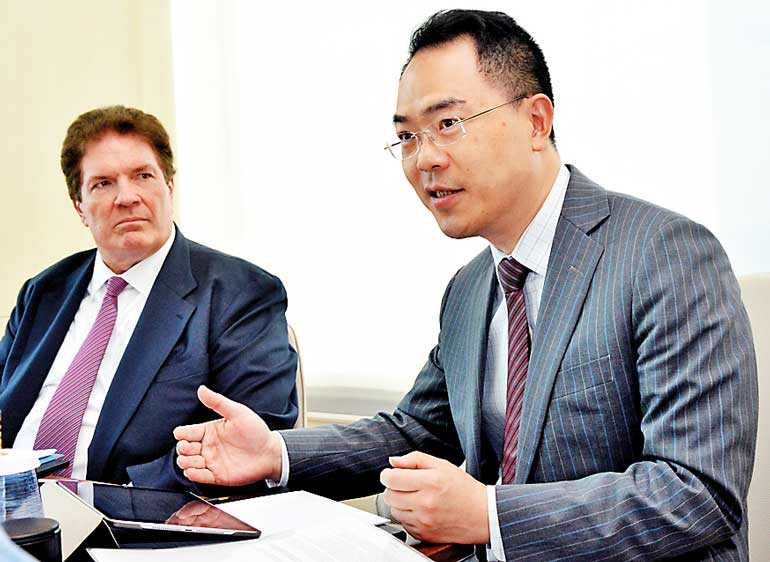Saturday Feb 28, 2026
Saturday Feb 28, 2026
Tuesday, 1 May 2018 00:10 - - {{hitsCtrl.values.hits}}
 Standard Chartered Bank (China) Head of Transactions Banking Sam Xu (right) who led a seven-member team from China speaks to the media in Colombo on Friday along with Standard Chartered Bank Sri Lanka CEO Jim McCabe – Pic by Upul Abayasekara
Standard Chartered Bank (China) Head of Transactions Banking Sam Xu (right) who led a seven-member team from China speaks to the media in Colombo on Friday along with Standard Chartered Bank Sri Lanka CEO Jim McCabe – Pic by Upul Abayasekara
By Nisthar Cassim
The Standard Chartered Bank is setting up a China Desk in its Head Office in Colombo to better serve the fast-expanding economic cooperation and business ties between the two countries at public and private sector levels.
“Sri Lanka is a compelling story for and in China’s Belt and Road Initiative (BRI) and we have seen growing engagement by China in Sri Lanka initially with Government-to-Government agreements and investments in key infrastructure. The engagement with the private sector is tipped to grow as well,” Standard Chartered Bank Sri Lanka CEO Jim McCabe told journalists on Friday.
“Setting up the China Desk with dedicated professional Chinese banking staff is a further sign of our commitment to support greater partnerships. The potential for expanding Sri Lanka-China ties and the socio-economic benefits are tremendous and exciting,” he added.
A seven-member team from the Standard Chartered Bank (China) Ltd., led by its Head of Transactions Banking Sam Xu, visited Sri Lanka last week, meeting officials of Chinese companies engaged in various mega projects in Sri Lanka and who are the clients of the bank.
The special visit by the SCB China team follows a similar exercise in Mumbai and Delhi early last week and concurrently by a separate team visiting Bangladesh and Pakistan.
China’s BRI encompasses Greater China, ASEA, South Asia, the Middle East, Sub-Saharan Africa and the Europe.
In Sri Lanka some of the BRI-inspired Chinese investments under public-private initiative include the Colombo International Container Terminal in Colombo Port and the Hambantota Port by China Merchant and the Port City and proposed Industrial Zone in Hambantota by China Harbour Engineering Corporation.
SCB said it has over 150 years of franchise in China with Shanghai as its second branch after opening the first in Calcutta. With around 1,000 branches and outlets in over 60 countries and regions, SCB said 70% of its global footprint was made up of the Belt and Road markets.
This, according to Xu, makes SCB a home bank in these markets as opposed to a foreign bank.
Xu revealed that last year Standard Chartered Bank’s China transaction banking unit saw BRI-related net incremental new business grow by 30% to $ 1.2 billion and a similar increase is forecast for 2018. He said China’s Central Bank was involved in 50 BRI-related deals worth $ 10 billion last year.
In Sri Lanka too, SCB’s portfolio of Chinese clients is growing, McCabe and Xu confirmed, and the visit by the team from China is to better understand clients’ needs to better support them in the future in terms of the entire gamut of banking services. These Chinese companies are also SCB’s existing clients in China.
Xu said that meetings with existing Chinese investors/clients were positive and they were excited about the opportunities in and with Sri Lankan whilst the team was also impressed with the progress of these projects/companies. The team also called on Chinese Ambassador Cheng Xueyuan.
McCabe said operational support to these large Chinese projects in Sri Lanka following Government-to-Government agreements had been on the rise along with volume of flow of funds.
Noting that several other banks too were competing for Chinese businesses, McCabe said given the substantial growth in China’s engagement via the BRI there was scope for banks to collaborate for the benefit of clients.
Whilst noting that projects and investments inspired by BRI were in their early stages and largely confined to infrastructure, McCabe said going forward there would be many touch points between Sri Lanka and this giant Chinese Belt and Road Initiative.
He added that sectors such as tourism too would benefit from the BRI and Chinese investments and the private sector would explore opportunities in other sectors such as agriculture, manufacturing, services and energy, etc.
Though India is not overly supportive of BRI, Xu said the SCB China team found out during their visit to Mumbai and Delhi that trading and banking activities between the two giants in Asia was increasing whilst China was also supporting India’s infrastructure development drive.